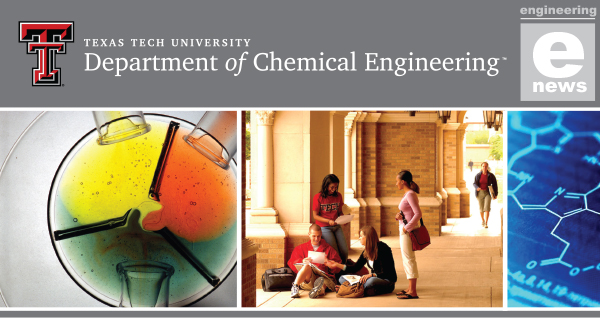
Graduate Student News
Ph.D. student, Ziye Dong, is one of five graduate students who will receive the prestigious Graduate Student Design and Research Award from the Biomedical Engineering Society (BMES). Ziye, who is supervised by Dr. Wei Li, works on biodegradable nanofilms for isolating and recovery of cancer cells. He is in his third year of the Ph.D. program and has published two papers as first author and three as coauthor. In his work, he has used hollow microspheres coated with a thin polymer film containing antibodies that specifically bind to the cancer cells in order to capture the cells from a blood sample. Since the microspheres are hollow, they float to the top of the liquid sample allowing them to be easily retrieved. Then the polymer film is enzymatically degraded in very mild conditions allowing the cells to be released and profiled. The technique developed is simple, fast, cost-effective, and can be used in remote areas and resource-limited settings. As part of the award, Ziye will receive funds to attend and present his work at the National BMES meeting in October.
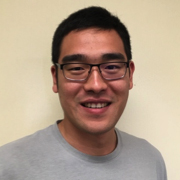
Ph.D. student, Qian Tian, received a travel grant to present her research results at the North American Thermal Analysis Society (NATAS) meeting, held in Newark, Delaware in August. Qian in investigating the effect of nanoconfinement on the monomer/polymer equilibrium in poly(n-alkyl methacrylate)s. The results are used to determine the amount of entropy lost by the polymer chains when they are confined. The fundamental understanding gained by this project is applicable to polymerizations used in lithographic and microelectronic applications. Qian is a third-year Ph.D. student supervised by Dr. Sindee L. Simon.
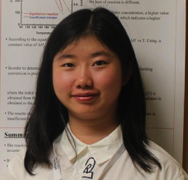
Ph.D. student, Raul Dominguez, was awarded a merit-based scholarship from the Hispanic Scholarship Fund. Raul is a second year Ph.D. student who is performing research in Dr. Harvinder S. Gill's laboratory on stem cell based therapies. In particular, he is investigating novel biomaterials to promote 3D culture of stem cells and their differentiation into different cell types. Stem cell therapies require a large number of cells for implantation. However, conventional 2D cultures do not fully utilize the 3D culture volume and have poor yields. In contrast 3D cultures can offer increased cell yields through better space utilization. However, presently there is lack of a robust 3D culture system. Raul and others in the Gill Lab are developing a novel biomaterial to address this unmet need. Of note, cells grown and then differentiated into other cell types in a 3D environment will feel less adaptation-stress upon implantation into 3D tissues of a human body as compared to cells grown on 2D surfaces. This is expected to translate into superior treatment efficacy. In addition to his research, Raul is a member of the Gamma Beta Phi Honor Society that focuses on community service, as well as a member of SHPE and AIChE.
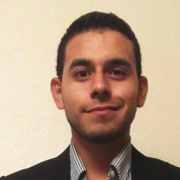
Alex Zapata, Tianyu Chen, and Nishat Anjum, all second-year Ph.D. students, were honored to receive the Best TA award for their performance as TAs in the Spring 2016 term. Each received a plaque and a $ 500 check sponsored by the Chemical Engineering External Advisory Board's Fund for Excellence. Alex was commended for his ability to make learning fun and to inspire students in the freshman course ChE 1305 Engineering Analysis. Tianyu was commended for his knowledge, approachability, and patience in teaching students in ChE 3232 Chemical Engineering Transport Laboratory. Nishat was commended for her patience and ability to explain challenging concepts as discussion leader for ChE 3330 Materials Science. With our large enrollments, the performance of the TAs becomes ever more critical for the success of our undergraduates, and this award recognizes the positive influence that these TAs had on the classes that they were associated with.
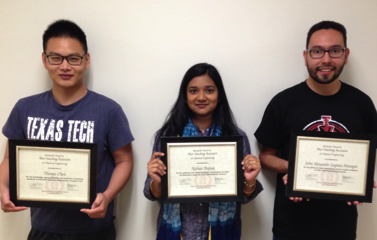
Edward E. Whitacre Jr. College of Engineering
-
Address
100 Engineering Center Box 43103 Lubbock, Texas 79409-3103 -
Phone
806.742.3451 -
Email
webmaster.coe@ttu.edu


